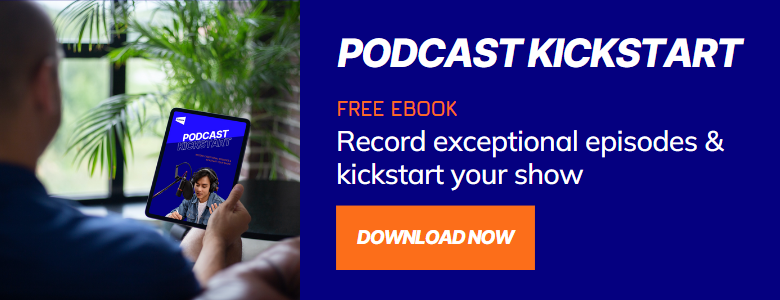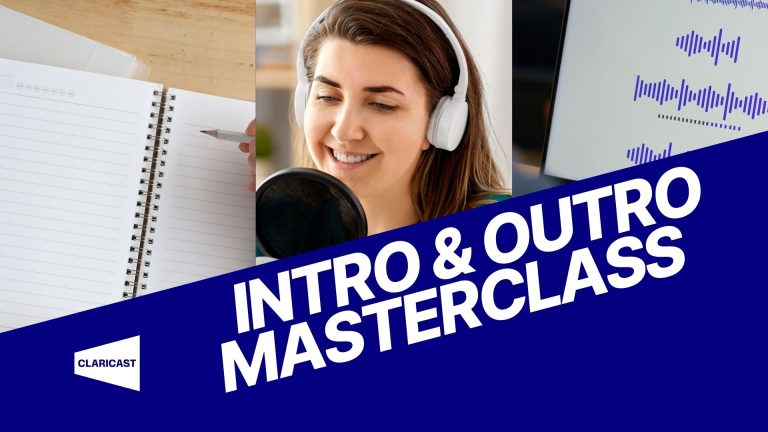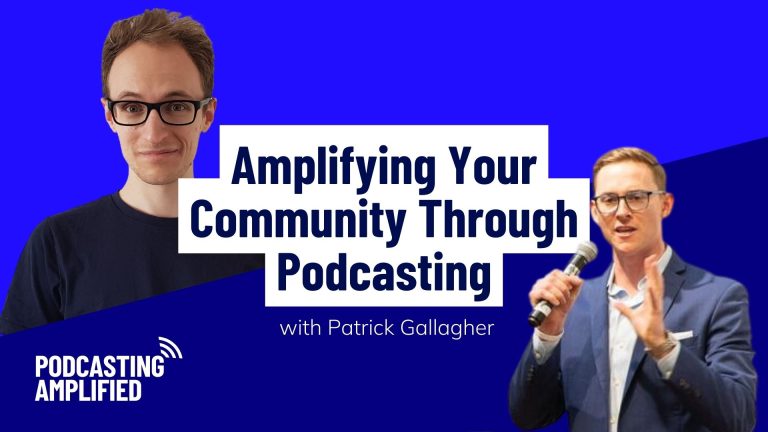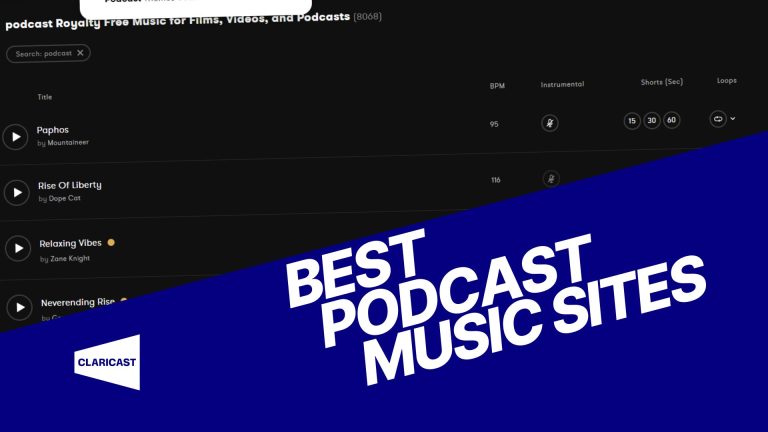Sticking to your podcast schedule can be tough. And coming up with new, exciting episode ideas each week is one of the biggest hurdles! In this article, I’m going to share 13 actionable tips on how to come up with podcast episode ideas.
With these tips, you’ll have the tools you need to come up with a whole year’s worth of podcast episode ideas to keep you going so that you can focus on creating!
HOW TO COME UP WITH PODCAST EPISODE IDEAS
1. KNOW YOUR IDEAL LISTENER
Who is your ideal listener? This is a question that we ask all of our clients. And a question you should be asking yourself before making just about any decision on your podcast.
Without knowing who your ideal listener (or ‘listener avatar’) is, you won’t know what content they’ll want to listen to. Simple as that.
Think about your audience. And if you don’t have one yet, consider who you want to listen to your show. What do they do for a living? How old are they? What problems do they have that they want your podcast to solve?

Before you can learn how to come up with podcast episode ideas, it’s essential that you know who you want to listen to those episodes. So that you can tailor your podcast to best solve their problems.
2. BRAINSTORMING & MINDMAPPING
Set aside some time to brainstorm topics for podcast episode ideas. Write down everything that comes to mind, they don’t have to be perfect ideas, yet. You can then organise these ideas into a mindmap and expand them.
The way I recommend doing this is to use mind-mapping software such as Miro so you can easily make changes. If you use project management software, you can use that instead. Or, if you’re a pen-and-paper person, that’s fine too!

The important thing is that you’re getting ideas down. Start with the main topics of your podcast. If you have a personal finance podcast, for example, your initial topics might be ‘saving’, ‘investing’, ‘budgeting’ etc. You can then branch off each of these into sub-topics like ‘investing’ > ‘asset classes’, ‘investment accounts’. Then, further branch off into more specific questions you can answer for your audience as episodes.
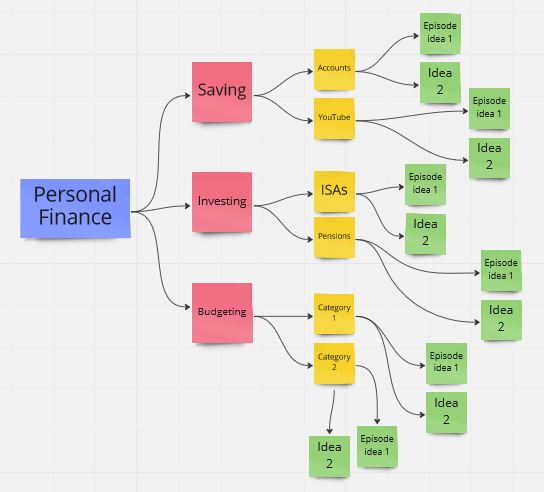
This is one of the most effective ways I’ve found of how to come up with podcast episode ideas in the early days of your podcast.
3. AUDIENCE Q&A
A Q&A An episode where you answer a pile of questions directly from your audience. This not only brings you closer to your audience and gives them exactly what they’re asking for, it also offloads some of the ideation work onto them!
Ask your listeners to submit questions. You can ask them to email you, or you can request questions on social media.
If you don’t have the audience for it yet, consider a ‘common questions’ type of episode. Where does your target audience hang out? Find a relevant Facebook or LinkedIn group and take note of the most common questions being asked.
4. RECENT, RELEVANT NEWS
Do you stay up to date with current events and trends in your industry or niche? If you work within your podcast niche or have an interest in it (I mean, I hope you do if you’re podcasting about it), you likely do.

You can incorporate these topics into your podcast. Recent, hot topics can quickly create a lot of traffic if you time your content right. And even if the media has already covered a story to death, your audience will still want to hear your personal take on it.
5. REPURPOSE TOP CONTENT
This one is easier for those who’ve been creating content for a while. Even if your podcast is in its early stages though, you might have another pool of content you’re sitting on, like a blog.
Which older episodes, articles or posts really resonated with people? You could create a podcast episode based around these, offering an updated take.
Take a look at your analytics and find existing, popular content that you can turn into a new episode.
I’ve had my own doubts about this technique in the past. “Why would my audience want to see the same piece of content again?” I would ask. But I remind myself that –
- Most of my newer audience won’t have seen the old content
- The people who did see it could still benefit from an update
- Repetition is essential to learning!
Pay attention to your analytics and find out what your audience wants more of.
6. RECENT CHALLENGES
What challenges have you faced recently in your work or personal life? Consider how a story like this could be translated into meaningful content for your audience. Showing your vulnerability and sharing your experiences can be really helpful to people who are going through similar challenges.
When structuring your story, consider the ‘STAR’ method. This is a method of storytelling that many interviewers look for, but it can be used to help you structure helpful stories. It goes like this –
- Situation – Set the scene
- Task – What were you trying to accomplish? And what challenges did you encounter?
- Action – What did you do to overcome the challenge?
- Result – What did you learn from the experience?
Keeping this in mind ensures that you’re not just telling your listeners about something that happened. You’re helping them learn from your wins and losses.
7. COLLABORATE WITH ANOTHER PODCASTER
Collaborating with another podcaster can be a great way to spice up your show and bring fresh ideas to your audience. It can be a benefit to both podcasters, as you can guest on each other’s show and offer tailored content to each other’s audience. When choosing a podcaster to collaborate with, consider the following –
- Find podcasts that are in the same niche as yours, but aren’t directly competing for the same listeners.
- Make sure you’re a good fit. You want to find someone whose style and content complement yours, rather than clash with it. Take some time to listen to their show and get to know their personality and perspective.
- Do they actively market their podcast? To make the most out of the partnership, you should both promote collaborative work with both of your audiences.
Once you’ve shortlisted a few options, reach out and come to them with some suggestions on the kinds of content you could make together that would be right for each other’s audiences.

The worst they can say is no, so don’t be afraid to reach out to other podcasters. Making connections can open up incredible opportunities!
8. WHAT ARE PEOPLE SEARCHING FOR?
Creating episodes around what people are searching for is a great way of giving listeners what they really want. And it’s especially useful for bringing in new listeners through SEO (search engine optimization).
In a nutshell, SEO is about getting your website and podcast episodes to appear higher in search engine results so that people are more likely to click on them. So creating episodes around search terms is effective for coming up with ideas, AND helping you show up in search.

“But how will I know what people are searching for?” I hear you ask. There are a few ways you can find out.
SEARCH SUGGESTIONS
Type in the start of a sentence on Google. A bunch of common search suggestions will come up. Can you make a podcast episode based on any of these searches? This can be particularly effective if nothing much is showing up yet for any of them when you run the search.
Try to prompt specific and less competitive searches that ask a question. For instance, typing in “IT industry” will bring up general, broad topics such “IT industry news”. Adding words such as “best”, “top”, “how” or “why” onto the search will give you more focused topics to create a podcast episode on. For example, “Why is certification important in the IT industry?”. Much more helpful!
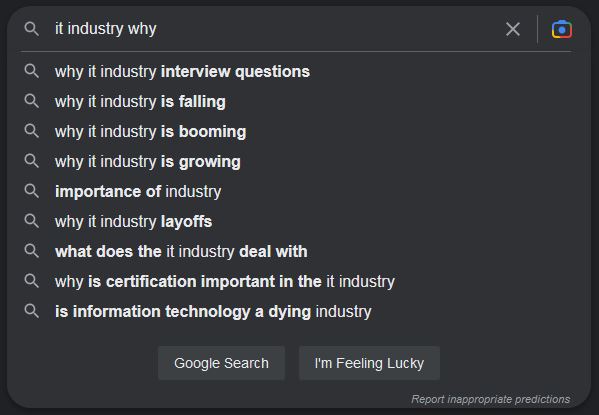
KEYWORD RESEARCH TOOLS
You can also make use of keyword research tools like Google Keyword Planner or Moz. These tools are designed specifically for the purpose of finding out what people are searching for. At the time of writing, Moz gives you a few free searches each month and Keyword Planner is free for those with a Google Ads account.

We won’t go into too much detail here (sign up to our newsletter to be notified when our full article on SEO drops), but these techniques should be enough to get some podcast episode ideas flowing.
9. INTERVIEW EPISODES
Do you normally record your podcast solo or with a regular co-host? Consider mixing things up by adding in interview episodes from time to time. Bringing on guests can help keep things interesting for your listener, and also give you a break from having to supply all of the insights!
Industry experts, clients and colleagues can all make worthwhile guests for your listeners.
It works the other way round too. If your podcast is usually an interview show, a solo episode every now and then can keep you from missing a week if a guest cancels at the last minute.
Make sure you keep in mind your ideal listener, though.
10. USE AN AI WRITING TOOL
You’ve heard of ChatGPT by now, right? AI tools like ChatGPT have taken the internet by storm. They are changing the way we interact with technology.
For podcasters, AI writing tools can help generate topic ideas. For example, if you tell ChatGPT to “give me ten ideas for podcast episodes for a podcast about real estate”, it should give you some suggestions such as –
“Home Buying Tips: Share tips and advice on how to navigate the home buying process, including things to consider before making an offer and how to negotiate a fair price.”
Pretty cool! The usefulness of the responses varies greatly. And you’ll need to tweak and build out the idea into something that works for your podcast. But if you’re really struggling, AI writing tools can be very useful for getting the ideation process started.
11. TOP # LISTS
People like numbered lists. They convert well. They’re compelling and easy to digest.
Think about your niche and what you can rank that would interest your audience. Let’s say your podcast is about recruiting in the IT sector. You’ll likely be talking about desired skills that candidates should have in various ways throughout your episodes. You could reformat them into a top 7 list.
It doesn’t matter if some of this is repeated content. As I mentioned earlier, repetition is an important part of learning. And the format is new. Listeners will want to know how you rank things.
12. GET FEEDBACK
Ask your listeners for feedback on what they would like to hear in your podcast. You can do this through social media polls, Google Forms surveys, or by encouraging listeners to reach out to you directly via email.
Keep an eye on your reviews too, they’ll give you insights into what your listeners do and don’t like. You might have to remind your listeners to leave a review as your call-to-action to get a worthwhile number of responses, though.
13. EXPERIMENT
Don’t be afraid to try new things and experiment with different formats, topics, and guests. If you’re early on in your podcast journey, experimenting helps you to gauge what kinds of content vibes with your listeners. And for podcasts that have followed the same formula for years, experimentation can keep your podcast fresh and exciting for your listeners, as well as fun for you!

USING YOUR PODCAST EPISODE IDEAS
With these 13 tips, you should be able to come up with plenty of podcast episode ideas. I recommend taking the time to sit down and use these tips to come up with a big list of ideas. Try to come up with as many ideas as episodes you release in a year. E.g. If you release 52 episodes in a year, aim for a list of 52. You’ll want to have a larger list to start with, so you can whittle down any you don’t think will work.

If you’re a batcher (you like to batch create content), you might want to do this all in one sitting. If this doesn’t suit you, try jumping back into your list for 15 minutes a week or so and add on a few more ideas.
It’s then a case of organising them into a schedule for the year. Stay flexible, though. If a time-sensitive idea comes to mind, you can always shift things around. It’s your podcast after all!


